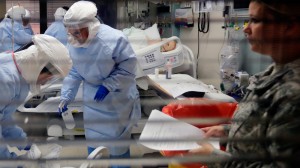Quarantined US nurse says ‘made to feel like a criminal’

Members of the Department of Defense’s Ebola Military Medical Support Team go through special training at San Antonio Military Medical Center, Friday, Oct. 24, 2014, in San Antonio. AP FILE PHOTO
NEW YORK – An American nurse published a scathing account Saturday of her treatment after being put in isolation in the United States following a stint caring for Ebola patients in West Africa, saying she was made to feel like “a criminal.”
Kaci Hickox was the first person to enter mandatory 21-day quarantine for medical staff returning to parts of the United States who may have had contact with Ebola patients in West Africa, the epicenter of the outbreak that has killed nearly 5,000 people.
The new rules took effect in New York and New Jersey on Friday, the same day Hickox returned.
“This is not a situation I would wish on anyone, and I am scared for those who will follow me,” Hickox wrote in The Dallas Morning News, saying she was showing no symptoms when she arrived back in the United States.
“I am scared about how health care workers will be treated at airports when they declare that they have been fighting Ebola in West Africa. I am scared that, like me, they will arrive and see a frenzy of disorganization, fear and, most frightening, quarantine.”
Article continues after this advertisementHickox, who landed at New Jersey’s Newark Liberty International Airport after working with Doctors Without Borders (MSF) in Sierra Leone, will be monitored at a hospital for 21 days, the known incubation period of Ebola.
Article continues after this advertisementHer account recalled the ordeal that began with her “grueling” two-day journey from Sierra Leone back to the United States.
Then, at the airport’s quarantine office in immigration, “one man who must have been an immigration officer because he was wearing a weapon belt that I could see protruding from his white coveralls barked questions at me as if I was a criminal,” Hickox said.
‘No one in charge’
Despite feeling “tired, hungry and confused,” Hickox said she tried to remain calm during the three hours that passed in the office.
“No one seemed to be in charge. No one would tell me what was going on or what would happen to me,” she said. “I wondered what I had done wrong.”
Hickox’s temperature was initially a normal 98 degrees Fahrenheit (37 Celsius). But four hours after she landed, a forehead scanner found it to be 101 degrees, suggesting fever.
“The forehead scanner was recording an elevated temperature because I was flushed and upset,” Hickox said, adding that she was left to languish alone in the room for another three hours.
No less than eight police cars then escorted her to the hospital, she said.
“Sirens blared, lights flashed. Again, I wondered what I had done wrong,” Hickox wrote.
“I had spent a month watching children die, alone. I had witnessed human tragedy unfold before my eyes. I had tried to help when much of the world has looked on and done nothing.”
At the hospital, her temperature was again normal, and an initial blood test came back negative for Ebola.
“I sat alone in the isolation tent and thought of many colleagues who will return home to America and face the same ordeal. Will they be made to feel like criminals and prisoners?” Hickox wrote.
“We need more health care workers to help fight the epidemic in West Africa. The US must treat returning health care workers with dignity and humanity,” she wrote.
‘Lack of clarity’
Doctors Without Borders said it was “very concerned about the conditions and uncertainty she is facing.”
Sophie Delaunay, executive director of MSF, added: “There is a notable lack of clarity about the new guidelines announced yesterday by state authorities in New York and New Jersey.”
The two US states ordered mandatory quarantine for returning medics after a doctor, Craig Spencer, 33, on Thursday became the first confirmed case of Ebola in New York.
He was immediately placed in isolation and on Saturday his condition had deteriorated slightly, but health officials stressed that was the “next phase” of the illness and was expected.
“The patient is awake and communicating,” a hospital statement said.
RELATED STORY